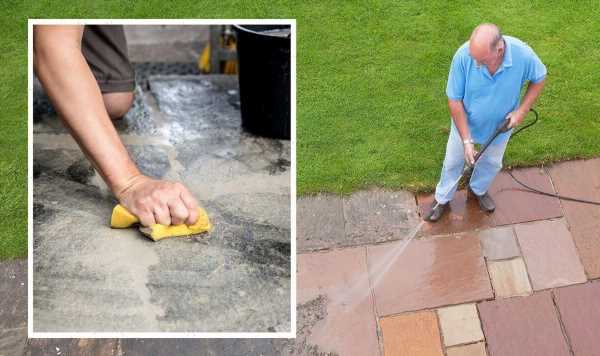Gardening tips: How to remove moss on drives and patios
We use your sign-up to provide content in ways you’ve consented to and to improve our understanding of you. This may include adverts from us and 3rd parties based on our understanding. You can unsubscribe at any time. More info
As the warm weather continues, homeowners and renters alike will be moving outdoors to enjoy it. For those keen on giving their patio and paving a little clean, Cass Heaphy, Digital Director at Paving Direct shared his expertise when it comes to scrubbing slabs, and the cleaning hacks to avoid.
Cass said: “Concrete block paving is porous. This makes the surface material susceptible to organic blemishes and growths such as black spots, algae and lichen, which enter the paving as microscopic spores, which then germinate and grow rooted within the concrete’s capillaries.
“To remove these growths, you can either use a specialist paving cleaning product or black spot and algae remover.
“When it comes to general cleaning your paving, you should avoid acid-based products and salt such as gritting salt at all costs.
“Recently, cleaning hacks have arisen, such as using ketchup or vinegar to clean their patio.

“However, as these products contain acetic acid, which is corrosive to stone and concrete paving, they [shouldn’t be] used to clean your driveway or patio.
“Limestone, sandstone and Portland cement concrete are all vulnerable to chemical erosion and corrosive damage from acids, so any acid-based liquid will partially corrode and damage the stone/concrete of the patio,” he said.
“To clean patio paving, an alkaline-based cleaner is recommended – with specialist patio cleaning products being the best bet to avoid any damage to the surface of stone or concrete block patios.”
Many homeowners use pressure washers to banish dirt and grime that has built up over winter.
Cass shared his thoughts: “When it comes to using a pressure washer, you want to use lower pressure settings.
“Patio joints can be damaged by high-pressure water jets, which can loosen and dislodge the pointing between the slabs.
“Likewise, high-pressure water jets can strip the pigment and surface material from concrete paving, and weaken and delaminate sandstone and limestone paving too.
“Frequent use of pressure washers at high-pressure should be avoided, as the damage that is done to your paving is cumulative.
“So, the more you do it, the higher the chance that the pressurised water jet will do some visible damage.”
To protect your patio, Cass suggested using a sealant.
He said: “The solution to most of these issues is to enhance the protection of your paving with a sealant that protects the capillaries and stops water and other gunk from getting into them, especially in high footfall areas like driveways.

“You can use a natural finish sealer, which leaves the paving looking as it was prior to sealing, or a colour enhancing sealant.
“Before you seal paving, you must clean it properly with an appropriate water-based patio cleaner that actually lifts the dirt and grime out of the capillaries.
“Leave the patio to fully dry and then seal it.
“The sealant will reduce the porosity of the stone or concrete whilst still allowing it to breathe.
“By sealing the capillaries, many of the inherent vulnerabilities of stone and concrete are significantly reduced.
“If you seal your paving every couple of years, you will extend its lifetime and keep it looking in tip-top condition, saving you money in the long term,” he advised.
While it’s important to ensure a patio is clean and in good condition, Cass also said it’s worth remembering to clean and maintain the furniture and garden wear that is placed on the patio.
“Don’t forget about your garden furniture when it comes to cleaning your patio,” the expert said.
“If you have iron or steel garden furniture where coatings or rubber feet have abraded on the feet, be aware that contact rust can occur on your paving.
“The best solution is to re-coat or add new rubber feet and winter store them in your shed or indoors to prevent furniture from staining your paving.”
Source: Read Full Article
